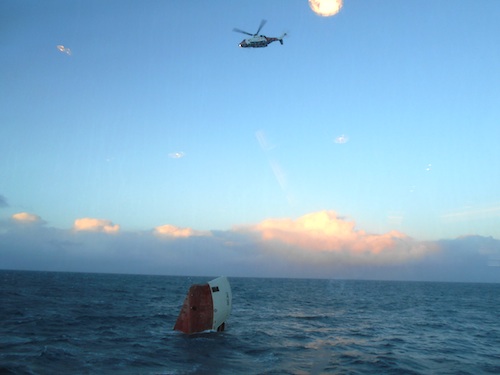Cargo ship sinking could have been avoided

The Marine Accident Investigation Branch report on the capsize and loss of Cemfjord and its eight crew in January of last year has been released, which states that the tragedy could have been avoided if the decision had been made to seek shelter instead of entering the “extraordinarily violent sea conditions” in Pentland Firth, caused by gale force winds and a strong, opposing tidal stream.
The cement carrier was on a voyage between Denmark and England when it capsized on January 2, and later sank in the Firth. The upturned hull of the vessel was spotted from the NorthLink ferry Hrossey the following day. No distress message was transmitted from the Cemfjord. An extensive search followed but none of Cemfjord’s eight crew were ever found.
Chief Inspector of Marine Accidents, Steve Clinch said: “The MAIB investigation found that Cemfjord capsized in extraordinarily violent sea conditions; a fatal hazard that was predictable and could have been avoided. The decision to enter the Pentland Firth, rather than seek shelter, was almost certainly a result of poor passage planning, an underestimation of the severity of the conditions and perceived or actual commercial pressure to press ahead with the voyage.
“Critically, this decision will also have been underpinned by an unwillingness to alter course across the heavy seas after the experience of a cement cargo shift in similar circumstances about three months before the accident.
“The appalling conditions and rapid nature of the capsize denied the crew an opportunity to issue a distress message or to escape from their ship.
“Although not a causal factor of the accident, it was also established that Cemfjord was only at sea because of Flag State approved exemptions from safety regulations. This tragic accident is a stark reminder of the hazards faced by mariners at sea and the factors that can influence decision making in such treacherous circumstances.”
• The report states that since the accident, Cemfjord’s managing company, Brise Bereederungs GmbH, has implemented several changes and initiatives aimed at improving the safe operation of its cement carrying vessels and the safety culture of its crews.
The changes include enhancements to its vessels’ stability management and weather forecasting capabilities in order to aid passage planning.
The Department of Merchant Shipping for the Republic of Cyprus has introduced a new process for managing requests from shipping companies for Flag State exemptions from international safety regulations. Det Norske Veritas-Germanischer Lloyd has appointed designated Flag State liaison officers to improve dialogue and enhance mutual understanding between itself and Flag States.
Safety recommendations have been made to: Brise Bereederungs GmbH to further improve the safety of its fleet of cement carrying vessels; the Republic of Cyprus’ Department of Merchant Shipping to enhance the management of its safety regulation exemption process; and to the UK Maritime and Coastguard Agency to review the arrangements for the safety of shipping in the Pentland Firth.

